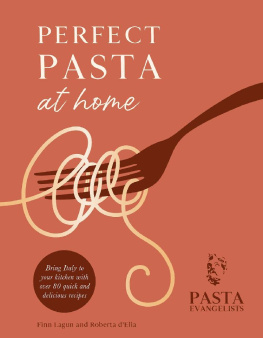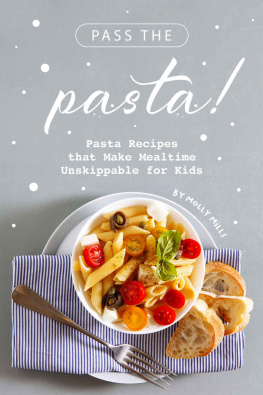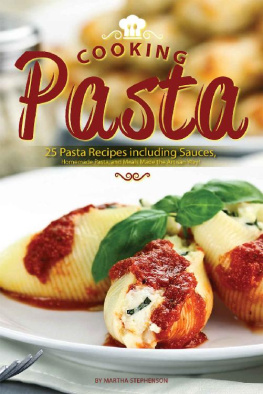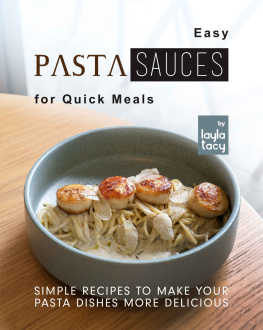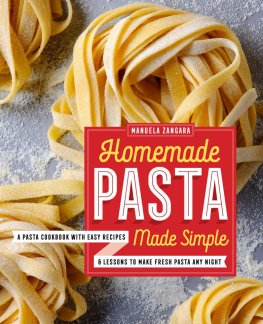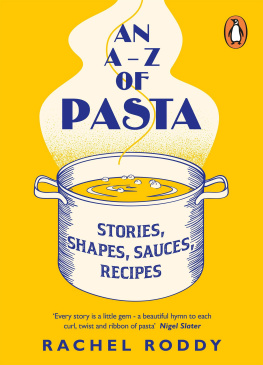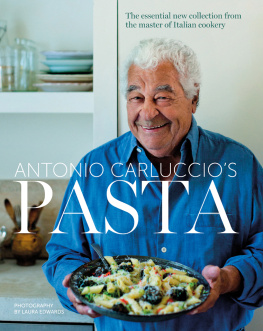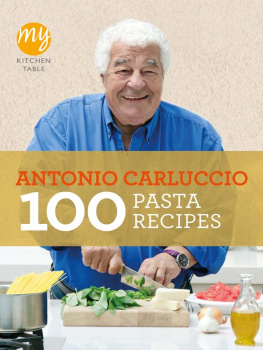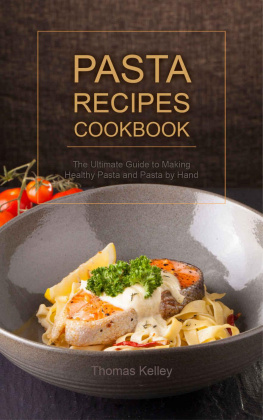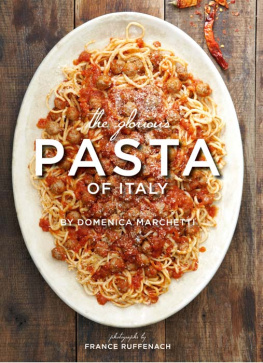
CONTENTS
First and foremost, grazie for picking up our book. We are Pasta Evangelists, a fresh pasta company based in London. We started the business back in 2016, delivering our first batch of freshly made gnocchi and basil pesto to friends. Fortunately, they liked it, word got out, and by the end of 2017 we were delivering boxes of our fresh pasta and sauces to a couple of hundred Londoners every week. A year later, Harrods was renovating its food hall and invited us to open our first fresh pasta concession there. We were a bit taken aback to be asked we were barely a business! but immensely proud. Of course we said yes, even though we knew nothing about retail, let alone in one of the worlds most famous department stores. A few years on, our team is still there, and we take immense pleasure in serving (and talking about) pasta all day long.
Mainly, though, were a pasta subscription company, offering boxes of freshly made pasta, authentic sauces and garnishes from Italy to our wonderful customers in all corners of the UK. At pastaevangelists.com, we have a menu of 15 different dishes each week, showcasing the wonderful and limitless world of pasta. In this book, weve included many of our favourite recipes, as well as some of the best-sellers from our website. We hope youll enjoy making them and would love to hear from you please do tag us on Facebook, Twitter or Instagram at @pastaevangelists.
Before you dive straight in, though, we want to tell you a bit about who we are and where we come from. Italian culture is full of stories and we are no different.
Roberta
One of our favourite recipes in this book, Orecchiette with Rocket and Potatoes (see ), is based on Robertas memory of growing up in Puglia, a sun-drenched region of the Italian south. In this arid, sleepy outpost of the Italian peninsula, groves of ancient olive trees and white-washed buildings dominate the landscape. The soul of its people, meanwhile, is rooted in religion and family life. Little has changed here for centuries, and, for the Pugliese, this is no bad thing; tradition is everything.
It was 1989, and the young Roberta then just six years old was already causing her parents some concern. You see, of more than 20 children living on the dElia family farm, Roberta was the most rambunctious. Twice already she had been caught red-handed emerging from the tomato vines of her neighbour, Signorina Teresa. On the third such occasion, a red-faced Roberta (she had learned to devour her plunder there and then, rather than be encumbered during her retreat) was discovered in the vines not by Signorina Teresa but by Maria-Assunta, her nonna (grandmother) and head of the family. To the young Roberta, it did not seem of any consequence that, by pilfering tomatoes from the poor Signorina Teresa, she was defying her nonnas Catholic teachings. All that mattered in Robertas mind were the sweet, blushing tomatoes, and how utterly wonderful they were.
For Maria-Assunta, though, a solution or rather distraction had to be found to keep her mischievous granddaughter occupied. To Robertas delight, this entailed food, but on her grandmothers condition that it had to be fairly procured. And so, Roberta and her nonna began rising together before dawn, while the rest of the family slept, to explore the farmstead for anything they could forage. In those early days, this mainly meant rucola (rocket), which grows spontaneously across the dElia familys farmland. This herb, sprouting from the soil, was easy for Roberta to gather; still small, she could only look on as her nonna plucked olives, both green and black, from the lands centuries-old trees. By midday, when Puglias searing heat set in, both grandmother and granddaughter would return to the cool of the farmhouse with baskets brimming with plenty of fresh rucola .
There, in the farmhouse kitchen, the real magic would begin. Roberta, by her own admission an impatient child, would watch, transfixed, as her nonna rolled out fresh pasta dough, shaping small pieces into orecchiette, or little ears, an iconic shape of Puglia (and one featured throughout this book). Maria-Assuntas orecchiette would be served for the entire family with the fresh rocket gathered earlier that morning, and with potatoes proffered by the men of the family, diced and boiled. This is where Robertas favourite dish has its origins.
By 1991, after more than a year working by her nonnas side, Maria-Assunta anointed her granddaughter the familys pasta princess. To this day, Roberta credits the late Maria-Assunta with establishing her Pugliesit (the quality of being, and feeling, Pugliese) through this formative time spent preparing orecchiette together in the farmhouse kitchen.
Alessandro
Around the same time, some 800 kilometres to the northwest, in the Italian Riviera, our co-founder Alessandro was also learning the virtues of pasta, albeit in a different milieu. Far from being confined to the cucina by his nonnas side, Alessandro or Alex to those who know him well was more often found terrorising the streets of his hometown, Genoa, with other teenage boys. He recalls being notorious among them for falling off his Aprilia scooter; one in five days are rainy there, and this climatic phenomenon, he insists, was responsible for the falls that so amused his friends. In any case, there was one weekly exception to this ritual, when Alexs loyalties lay elsewhere.
In Italy, schools open from Monday to Saturday, though they finish early around 1pm. In this way, the weekend, as Alex and his friends knew it, began on Saturday afternoon. And as this weekly apotheosis came about, Alex would disappear off on his moped into the hills above the city. His friends, loitering in the carrugi (Genoas historic narrow streets) below, could not comprehend this desertion. Like clockwork, when Alex rejoined the group the following morning, they would probe for a while, trying to tease out the reasons for his flight. But hed never tell, and soon theyd let it go, only for the same thing to happen the next weekend.
The truth of Alexs whereabouts was known to only one other: his nonna, Maddalena. You see, while Alex had sat in lessons that morning, Maddalena had been preparing all of her grandsons favourite things to eat. This was not a proposition Alex could turn down, for Maddalena was a fantastic cook. Far less, though, could he tell a bunch of adolescent boys that he preferred spending time with Granny than them. And so, as his Aprilia lurched into his nonnas backstreet, hed cast a glance over his shoulder before parking up. His friends never tailed him though; all he ever saw was the old town below and the Ligurian Sea in the distance. Secure in the knowledge that his Saturday secret was safe, Alex would announce nonna, sono qui ! (nonna, Im here!). As his nonna opened her home to her grandson, the smell of focaccia, baking in her oven, would fill the veranda. At this point, Alexs nose could discern which treats lay in store, and what level of rapture he might attain that afternoon.
Indeed, while focaccia is mainly understood outside of the region as being topped with olive oil, sea salt and perhaps rosemary, in Liguria varieties abound. Alexs favourite is focaccia di recco , made by sandwiching fresh stracchino cheese from the region between sheets of dough. If he was lucky, his nonna would have made this, and often she did. Most exciting for Alex, though, was watching Maddalena prepare her signature gnocchi al pesto . Just like Roberta, several hundred kilometres to the south, Alex would gaze on as his nonna rolled out the dough from flour, potato and eggs. Shed craft each individual gnocco by hand, using a riga gnocchi , a wooden board with ridges that give home-made gnocchi their rustic appearance. Once dragged gently down the board, each dumpling would be placed delicately on a floured surface before Maddalena moved onto the next. It was poignant to watch the hands of this wizened old woman move with such dexterity. The memory of these Saturday afternoon displays of craftsmanship would later provide Alex with the idea for Pasta Evangelists.
Next page
